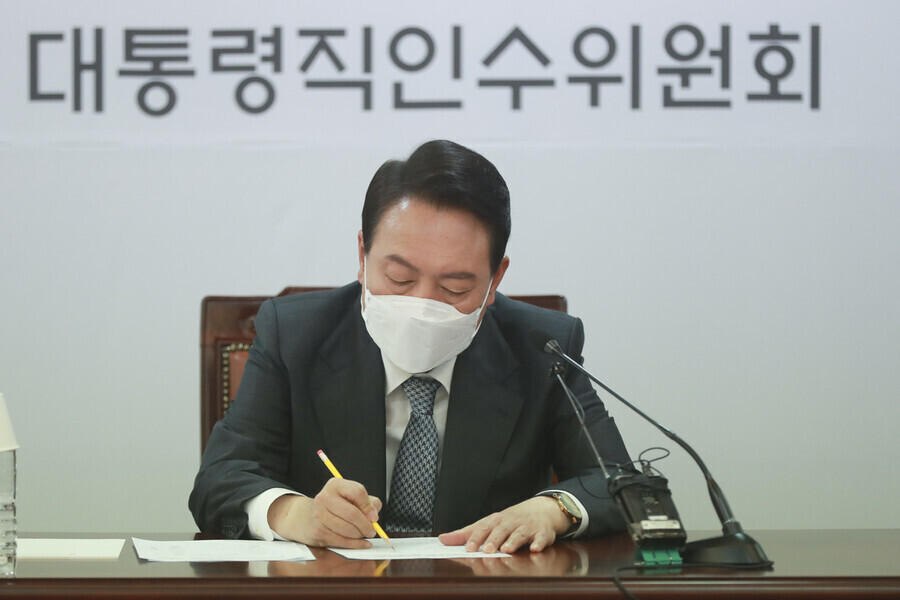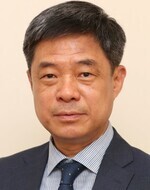hankyoreh
Links to other country sites 다른 나라 사이트 링크
[Column] A month of Yoon shows he’s following footsteps of failed former presidents


South Korea’s presidential election took place on March 9, which means we’ve had almost a month with Yoon Suk-yeol as the president-elect.
The two months between election and inauguration don’t leave a lot of time to prepare for five years of governance, but Yoon has been the subject of major attention and anticipation as the next leader. He’s drawn some praise for his unceremonious and media-friendly demeanor — but in terms of substance, it’s hard to grade his performance over the past month very highly. He’d get 50% marks just for doing nothing, but he’s fallen well short of even that.
To get right down to it, Yoon is following in the footsteps of failed former presidents. He’s succumbing to what’s known as the “winner’s trap,” as we see signs of the derailment that comes from overconfidence and foolhardiness in the wake of an election victory.
It manifests as a focus on tinkering with the wrong things, while ignoring the things that really need to be changed.
Obviously, his plan for relocating the presidential office to Seoul’s Yongsan District is a prime example of this. The sort of policy development and execution process that should be taking place on a rational and democratic basis is instead being pushed forward peremptorily by the president-elect on his own.
It has been more or less a farce so far, spawned by the stubbornness of an inexperienced president-elect. Opinion polls show a majority of the public opposing the move; even quite a few conservative opinion leaders have argued against it. The idea that there is “popular demand” to quickly open up the current Blue House is certainly news to the rest of us.
The central arguments concerning the Yongsan relocation seem to have more or less taken shape. Some argue that the approach to communication is more important than physically leaving the Blue House; that it’s certainly within our capabilities to relocate the presidential office if we have to; that if we’re going to relocate it Yongsan, it should be done in an orderly way; and that we should also consider more fundamental measures, such as relocating it to Sejong rather than Yongsan.
Even current President Moon Jae-in seems to have backed down in the face of Yoon’s stubbornness, which means the relocation is poised to go ahead despite the lack of popular support. But the consequences are likely to be considerable.
The key aspect of the Yongsan controversy is the fact that Yoon seems to be treading the same arrogant and self-righteous footsteps as previous presidents. With the stated goal of “leaving the past behind,” he is actually reenacting it.
He doesn’t seem to recognize what’s really important, while his misplaced belief that the “vices of the imperial presidency” will be overcome if he can just quickly get away from the presidential residence seems outright bizarre.
Second, Yoon’s nomination of Han Duck-soo to be prime minister shows no kind of a departure from the appointment practices of past presidents. He claims that it’s meant to ensure a smooth National Assembly confirmation, but it’s tough to find any message in it.
In Han, we see the same sort of complacency and bureaucracy-centric mentality that we saw in figures like Han Seung-soo and Chung Hong-won, who were the first prime ministers of the Lee Myung-bak and Park Geun-hye administrations, respectively.
As someone without political experience himself, Yoon needs someone who is adept at administration. But there is no shortage of things you can’t achieve by relying on officials.
Since the first appointees were announced, Yoon and Han have been talking about “responsible prime ministers” and “responsible ministers.” But apart from the addition of the word “responsible,” very little has changed.
Prime ministers don’t become responsible or accountable just because you call them that. You have to start during the selection process, choosing the people and pathways to be assigned responsibilities and roles.
You can’t just nominate someone and then call them a “responsible prime minister.” Unless there’s a selection process oriented toward finding a “responsible minister,” they’re just going to do whatever they feel with the power entrusted to them. It’s not much different from the same empty rhetoric about “giving power to the Cabinet” that past administrations have used when setting theirs up.
Third, we’re seeing signs of a new “eradicating vices” trap in the uproar over the price of first lady Kim Jung-sook’s clothing and the rhetoric over prosecutors investigating an alleged blacklist at the Ministry of Trade, Industry and Energy.
Judging from the way Korea’s conservative media has been behaving — falling over themselves to rake the departing administration’s “corruption” over the coals for the clothing controversy, without offering any clear evidence to support their claims — it’s easy enough to predict how things are going to play out going forward. Once the mood starts turning chilly in the wake of June’s local elections, the prosecutors and conservative media are going to take turns stirring up public opinion and crusading against “vices.”
If Yoon really intends to draw lessons from the Moon administration, there’s quite a lot he could learn.
In cases like efforts to eradicate vices, prosecutorial reform, real estate issues, and the Cho Kuk saga, the Moon administration has had its share of opportunities to slow its pace within reason. After the Democratic Party’s local and general election victories, it should have recognized that too much can be as bad as too little and corrected its course.
The administration didn’t do that. Caught in the grip of a collective fixation on what it “had to” achieve, it ended up handing the reins over to the administration’s swordsman.
It’s concerning to think that Yoon is likely to end up walking down the same road, partly because of and partly despite himself. Those who live by the sword are said to die by it as well. Yoon needs to recognize that the sword he wielded for the prosecutors is fundamentally different from the one he will hold as president.
Those in the president-elect’s orbit are apparently flattering him, telling him that with expectations so low before his inauguration, things can only get better once he’s in office.
It’s a serious problem when a president-elect is being shunned by the public as early as the transition committee stage. Yoon needs to face up to reality. He should look at the world and his surroundings not from the eyes of the “victor,” but from the eyes of the loser, the have-not, the forgotten ones.
He needs to recognize that there isn’t a lot a president can do when they go about things from a “humble” posture — and that if there are things he can let go of, he should do it quickly.
Please direct questions or comments to [english@hani.co.kr]

Editorial・opinion
![[Guest essay] Preventing Korean Peninsula from becoming front line of new cold war [Guest essay] Preventing Korean Peninsula from becoming front line of new cold war](https://flexible.img.hani.co.kr/flexible/normal/500/300/imgdb/original/2024/0507/7217150679227807.jpg) [Guest essay] Preventing Korean Peninsula from becoming front line of new cold war
[Guest essay] Preventing Korean Peninsula from becoming front line of new cold war![[Column] The state is back — but is it in business? [Column] The state is back — but is it in business?](https://flexible.img.hani.co.kr/flexible/normal/500/300/imgdb/original/2024/0506/8217149564092725.jpg) [Column] The state is back — but is it in business?
[Column] The state is back — but is it in business?- [Column] Life on our Trisolaris
- [Editorial] Penalties for airing allegations against Korea’s first lady endanger free press
- [Editorial] Yoon must halt procurement of SM-3 interceptor missiles
- [Guest essay] Maybe Korea’s rapid population decline is an opportunity, not a crisis
- [Column] Can Yoon steer diplomacy with Russia, China back on track?
- [Column] Season 2 of special prosecutor probe may be coming to Korea soon
- [Column] Park Geun-hye déjà vu in Yoon Suk-yeol
- [Editorial] New weight of N. Korea’s nuclear threats makes dialogue all the more urgent
Most viewed articles
- 1Yoon’s broken-compass diplomacy is steering Korea into serving US, Japanese interests
- 2[Guest essay] Preventing Korean Peninsula from becoming front line of new cold war
- 3[Column] Why Korea’s hard right is fated to lose
- 460% of young Koreans see no need to have kids after marriage
- 5[Guest essay] Maybe Korea’s rapid population decline is an opportunity, not a crisis
- 6S. Korean first lady likely to face questioning by prosecutors over Dior handbag scandal
- 7[Reporter’s notebook] In Min’s world, she’s the artist — and NewJeans is her art
- 8After 2 years in office, Yoon’s promises of fairness, common sense ring hollow
- 9Amid US-China clash, Korea must remember its failures in the 19th century, advises scholar
- 10[Column] The state is back — but is it in business?